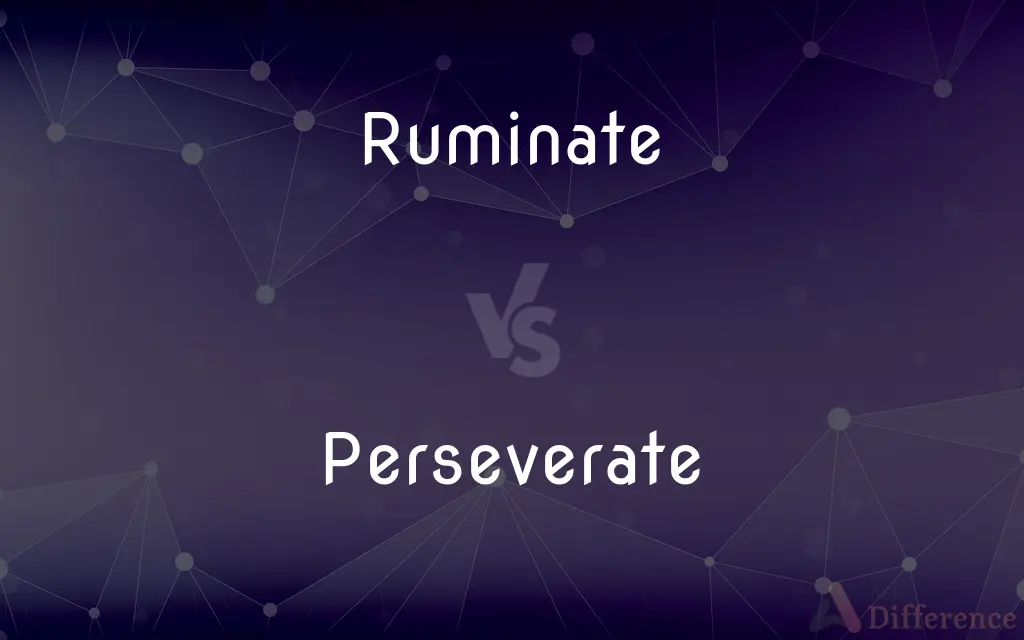Ruminate vs. Perseverate — What's the Difference?
By Tayyaba Rehman & Maham Liaqat — Updated on March 29, 2024
Ruminate involves deep thinking or pondering, often repetitively, while perseverate refers to the uncontrollable repetition of a particular response, despite the absence of a stimulus.

Difference Between Ruminate and Perseverate
Table of Contents
ADVERTISEMENT
Key Differences
Rumination is a cognitive process where an individual thinks deeply about something again and again. It often involves dwelling on negative thoughts or problems without reaching a solution. This can be reflective of a thoughtful consideration or a maladaptive pattern, such as in anxiety or depression. Whereas perseveration is a psychological phenomenon where a person repeats a word, phrase, or action, even when it is no longer relevant or appropriate. This is often seen in neurological disorders, such as autism or brain injuries.
While rumination is more about the content of thoughts, often being negative or problem-focused, perseveration is about the act of repetition itself, regardless of the content. Rumination can lead to insights or solutions in a positive context but is typically unproductive when it revolves around negative thoughts. On the other hand, perseveration is generally considered maladaptive, indicating an inability to shift thoughts or actions in response to new information or contexts.
Rumination can sometimes be voluntary, as when someone chooses to deeply consider a philosophical idea or a personal dilemma. In contrast, perseveration is usually involuntary, occurring without the individual's conscious choice and often beyond their control. This distinction highlights the difference in how these thought processes affect mental health and behavior.
The term "ruminate" originates from the Latin for "to chew over again," akin to how cows chew cud, reflecting the process of mulling over thoughts repeatedly. "Perseverate," however, comes from Latin "perseverare," meaning "to persist," but in psychological terms, it describes a stuckness or failure to adapt one's responses.
While both processes involve repetition, the context and implications of rumination versus perseveration differ significantly. Rumination's repetitive nature can sometimes lead to psychological distress or hinder problem-solving when focused on negative aspects, whereas perseveration's repetitive actions or thoughts are typically seen as a symptom of cognitive or neurological issues, showing a lack of adaptive responses.
ADVERTISEMENT
Comparison Chart
Definition
Deep, repetitive thinking on a subject
Uncontrollable repetition of a response without stimulus
Nature
Cognitive, can be voluntary or involuntary
Psychological, involuntary
Content Focus
Often negative or problem-focused
Not content-specific
Psychological Impact
Can lead to insights or distress
Generally maladaptive, indicates cognitive/neurological issues
Origin of Term
Latin "ruminare" - to chew over again
Latin "perseverare" - to persist
Example in Behavior
Dwelling on past events or hypothetical situations
Repeating a word or action irrelevantly
Compare with Definitions
Ruminate
To ponder or reflect on a subject or problem.
Philosophers ruminate on the nature of existence.
Perseverate
Displaying the tendency to continue or repeat an act beyond the typical endpoint.
She perseverated in her washing, checking the door repeatedly long after it was locked.
Ruminate
Engaging in contemplative thinking.
Ruminating on past mistakes can be both a curse and a blessing.
Perseverate
To repeat or prolong an action, thought, or utterance after the stimulus that prompted it has ceased.
After the debate, he perseverated on the argument, unable to let it go.
Ruminate
To think deeply about something.
She ruminated on the choices before her, considering each possibility.
Perseverate
The act of persisting in or repeating something.
His tendency to perseverate on a single topic made conversations difficult.
Ruminate
To go over in the mind repeatedly and often casually or slowly.
He found himself ruminating over the day's events every night.
Perseverate
A symptom of neurological disorder where an individual repeats actions.
Patients with brain injuries may perseverate, repeating phrases or actions irrelevantly.
Ruminate
To meditate on or contemplate.
She ruminated on the feedback from her mentor for weeks.
Perseverate
The uncontrollable repetition of a particular response.
In his excitement, the child perseverated on the word yes to every question.
Ruminate
To turn a matter over and over in the mind.
Perseverate
To manifest or experience perseveration.
Ruminate
To chew cud.
Perseverate
To persist in doing something; to continue to repeat an action after the original stimulus has ended.
Ruminate
To reflect on over and over again.
Perseverate
To cause the perseveration of (a given reflex or response).
Ruminate
(intransitive) To chew cud. (Said of ruminants.) Involves regurgitating partially digested food from the rumen.
A camel will ruminate just as a cow will.
Perseverate
Psychology: repeat a response after the cessation of the original stimulus;
The subjects in this study perseverated
Ruminate
(intransitive) To meditate or reflect.
I didn't answer right away because I needed to ruminate first.
Ruminate
(transitive) To meditate or ponder over; to muse on.
Ruminate
(botany) Having a hard albumen penetrated by irregular channels filled with softer matter, as the nutmeg and the seeds of the North American papaw.
A ruminate endosperm
Ruminate
To chew the cud; to chew again what has been slightly chewed and swallowed.
Ruminate
To think again and again; to muse; to meditate; to ponder; to reflect.
Apart from the hope of the gospel, who is there that ruminates on the felicity of heaven?
Ruminate
To chew over again.
Ruminate
To meditate or ponder over; to muse on.
Mad with desire, she ruminates her sin.
What I knowIs ruminated, plotted, and set down.
Ruminate
Having a hard albumen penetrated by irregular channels filled with softer matter, as the nutmeg and the seeds of the North American papaw.
Ruminate
Chew the cuds;
Cows ruminate
Ruminate
Reflect deeply on a subject;
I mulled over the events of the afternoon
Philosophers have speculated on the question of God for thousands of years
The scientist must stop to observe and start to excogitate
Common Curiosities
How can one manage or reduce rumination?
Strategies include mindfulness, engaging in activities that fully occupy attention, and cognitive-behavioral techniques to change thought patterns.
Can rumination be positive?
Yes, rumination can be positive if it leads to insights or solutions, though it often dwells on negative aspects.
Are there interventions for perseveration?
Yes, interventions include behavioral strategies, cognitive therapy, and, in some cases, medication to manage underlying conditions.
What differentiates rumination from perseveration?
Rumination involves deep, often negative thinking on a subject, while perseveration is the uncontrollable repetition of an action or thought without a stimulus.
How does rumination affect mental health?
Rumination can exacerbate conditions like depression and anxiety by focusing on negative thoughts and preventing problem-solving.
Can meditation help with rumination?
Meditation can help by teaching mindfulness and helping individuals learn to redirect their focus away from negative thoughts.
What causes someone to ruminate or perseverate?
Causes can include stress, anxiety, depression (for rumination), and neurological conditions or brain injuries (for perseveration).
How can perseveration affect daily life?
It can interfere with social interactions, learning, and the ability to move on from tasks or thoughts, impacting daily functioning.
Why do some people ruminate more than others?
Factors include personality traits, mental health status, and coping mechanisms for stress and emotional regulation.
Is there a difference in how rumination and perseveration are treated?
Yes, treatment approaches differ, focusing on cognitive-behavioral strategies for rumination and a mix of behavioral and medical interventions for perseveration.
Is perseveration always a sign of a neurological disorder?
While often associated with neurological issues, perseveration can occur in typical developmental stages or under stress.
Is it possible to stop perseverating on something?
With appropriate interventions and strategies, it's possible to reduce perseverative behaviors and thoughts.
Does the environment influence rumination or perseveration?
Yes, stressful or unsupportive environments can increase rumination, while changes in environment can trigger perseveration in susceptible individuals.
Can both rumination and perseveration occur in the same individual?
Yes, an individual can experience both, especially if they have underlying psychological or neurological conditions.
How do experts identify perseverative behavior?
Through behavioral observations and assessments that evaluate the individual's responses and their adaptability to changing situations.
Share Your Discovery

Previous Comparison
Crout vs. Trout
Next Comparison
Enchilada vs. ChalupaAuthor Spotlight
Written by
Tayyaba RehmanTayyaba Rehman is a distinguished writer, currently serving as a primary contributor to askdifference.com. As a researcher in semantics and etymology, Tayyaba's passion for the complexity of languages and their distinctions has found a perfect home on the platform. Tayyaba delves into the intricacies of language, distinguishing between commonly confused words and phrases, thereby providing clarity for readers worldwide.
Co-written by
Maham Liaqat














































